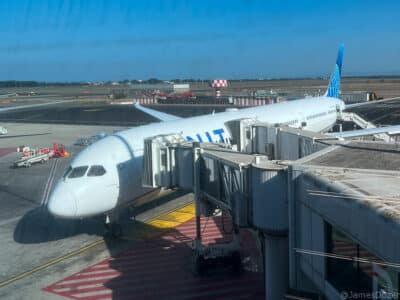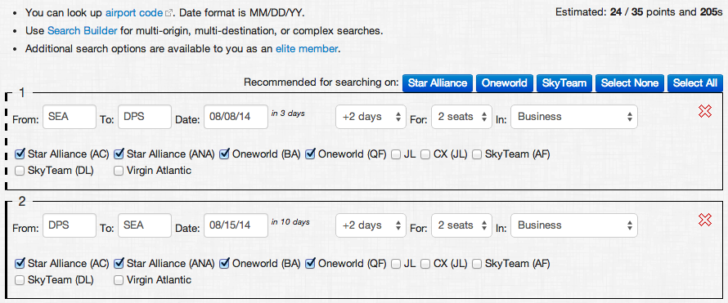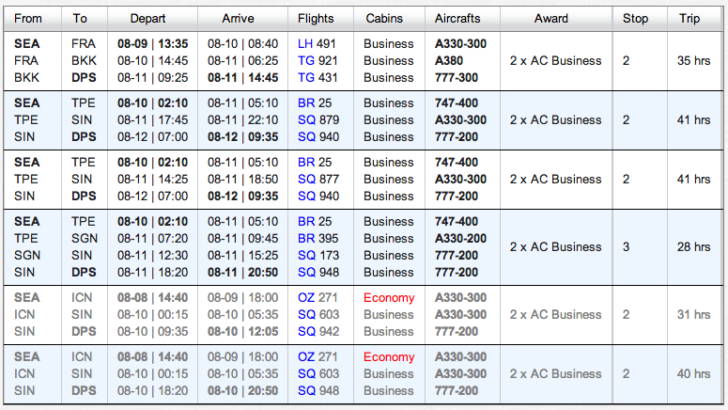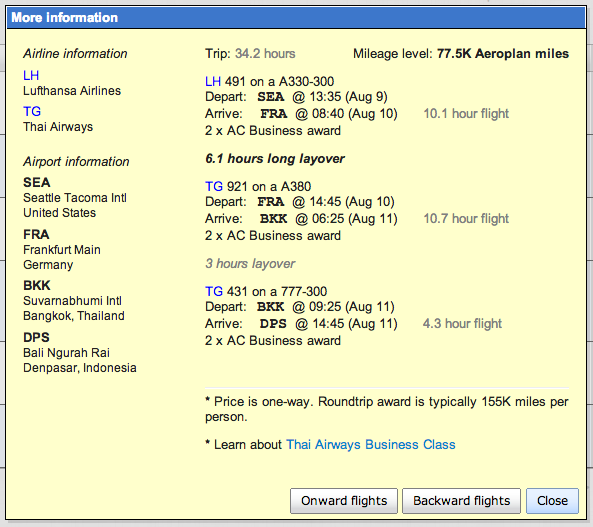I should preface this post by saying I do all the grunt work when I book awards. Why? I don’t do it often — maybe two or three international trips a year, and domestic flights are relatively easy. I also kind of enjoy the process, even though I curse British Airways every time it asks if I want a stopover in London when flying from San Francisco to Hong Kong. Ever since I was a kid I enjoyed the planning trips, probably more than actually taking them.
But most people are not masochists.
You could rely on an award booking service. I am at least smart enough to realize I would have zero fun booking awards for others, so I don’t do it myself. But there are many options out there. Most will charge between $100-200 a person. It doesn’t sound cheap until you consider how much effort it can take for a relatively inexperienced person with better things to do.
If you want to do it yourself, don’t want to pay an award booking service, and still feel intimidated by the effort required, I suggest you try using Award Nexus. (Full disclosure: They gave me some free points to prepare for my talk at FTU Advanced last month.) I mentioned a few tricks on Monday about how to plan an itinerary — whether for paid or award travel — and included a screenshot showing that Award Nexus will do this for you. It has lots of helpful tools like that, including a free guide you can read without becoming a customer.
But the real benefit of Award Nexus is that it does the searching for you. It doesn’t pull from any new or unusual sources. Remember I also provided in Monday’s post some suggestions for where to search for award space. What Award Nexus does is go to these same sites and search on your behalf. Because it uses a computer it can search much faster and skip over that annoying “stopover?” button that British Airways uses to slow you down. It can repeat the search if Qantas crashes (again). It can cross reference ANA and Aeroplan to give you more comprehensive search results than United even though United is, in fact, easier to use for a human.
Pricing
Award Nexus charges points to perform these services. Adding more flights, more search dates, or more websites will increase the number of points required. But if you sign up with your MilePoint or FlyerTalk handle you can get 200 points free and top up with an additional 100 free points every 90 days. There are also a few Premium Membership options and a Trip Pass that’s designed to provide unlimited searches for booking one specific trip.
Award Search
I’ll come back and explain some of the tools and features later, but today I’m just going to show you how to run a basic search. It’s super easy and probably sufficient for most of you. Remember that the cost of your search increases as you add more options, so don’t go crazy and check all the boxes (it will also take super long to run).
Log in, go to the menu bar at the top of the page, and choose Award Search > Find Awards Now. I think I want to go back to Bali in a couple weeks. So I enter the airport information and dates. Note that you can search multiple dates at once, but you can only search forward in time, not plus/minus days. I’m willing to depart on Friday, Saturday, or Sunday, so I picked 8/8 + 2 Days and returning 8/15 + 2 Days.
I’m happy with Business Class, so I’ll set it there. And I need two seats, of course. Megan won’t let me fly to Asia and leave her at home again. Picking websites is more tricky. You usually don’t need to pick more than one option for each alliance. But some of them have annoying proclivities, like Aeroplan’s tendency to route you through Canada or ANA’s refusal to search for more than one connection. Award Nexus has some observations on its Award Tips page. My suggestion is that you check multiple websites if you are doing a simple search. Including four websites and seven travel dates (three outbound, four return), the search I’ve outlined so far will require 24 points.
Since the search may take a few minutes to run, there is an option to have your results emailed to you. They are also saved automatically so you can go back to them later if you need to remember which routes and dates had availability in the past (e.g., it may still exist and you just need to work on improving some of the connections). In this case, my search only yielded results on the outbound portion of my journey. It first appeared as a calendar, but I prefer the detailed list view.
Yeah, there are still a couple of economy class segments. Click on one of those options and it will show you how long you spend on each flight in each class, the type of aircraft, and even a convenient calculation of your time in the back of the bus. Some results that have an extremely high percentage of economy class travel will automatically be shoved to the bottom of the results page so you don’t see them.
For example, the best option presented to me was via Europe, from Seattle to Denpasar connecting in Frankfurt and Bangkok. The next best option via Taipai over the Pacific was six hours longer due to long connections. A few other options with one stop in Seoul would mean spending over half my trip in economy class. Award Nexus not only did the search faster (about three minutes), it also presented the results in a very easily understood format. Like ITA Matrix, it doesn’t book the flight but helps you find the one you want.
Notice that I didn’t get any results for my return trip. Remember that Award Nexus can only expedite the search process for you, filter out some bad results, and cross reference multiple websites to make sure you’re viewing everything that’s available. It can’t make the computers any smarter. Don’t forget the tips I provided about planning your itinerary. If you’re having trouble booking an trip all at once, break it down and search segment by segment. There could be all the first class award space on Singapore Airlines you could ever want from San Francisco–Singapore, but that won’t help you if the Seattle–San Francisco or Singapore–Denpasar segments are unavailable.
Award Nexus can help you strategize this step, too, although I’ll discuss these tools in future posts. You should at least have a good introduction to one of the better and (potentially) free services out there for frequent travelers. My suggestion is you sign up and start exploring for yourself. It’s the best way to learn.







